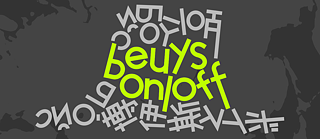beuys on/off
Beuys on, Beuys off

Joseph Beuys travelled to Tokyo in 1984. “Eurasia,” the utopian unity of Europe and Asia, formed an important point of reference for his artistic work. For his centenary this year, the Goethe-Institut Tokyo is launching the project “beuys on/off”.
Since the early 1960s, ideas about Eurasian unity played an important role in Beuys’s work. He coined the term “Eurasia” to describe a unity of Europe and Asia that would resolve the contrasts between Western and Eastern cultures. During a visit to Japan in 1984, Beuys held discussions with Japanese students and organised a performance with the South Korean composer Nam June Paik. “beuys on/off” is a response to Joseph Beuys from a “Eurasian” perspective for which artists, activists, practitioners and scholars come together for a critical examination of Beuys.
“What if Beuys were alive in the internet age?” During the opening discussion on 4 April 2021, everything will revolve around this question. Artistic director Mizuki Takahashi will meet Dominique Chen, associate professor at Waseda University, Sakiko Sugawa, co-founder of the Centre for Reproductive Work, the artists Gulnara Kasmalieva and Muratbek Djumaliev, Taeyoon Choi, artist, educator and co-founder of the School for Poetic Computation, and Jung-Yeon Ma, film and media scholar as well as dj sniff, musician and curator, who will present the individual project parts of beuys on/off.
The event will be streamed on 4 April from 10 am (CEST) on the Facebook page and the YouTube channel of the Goethe-Institut Tokyo.